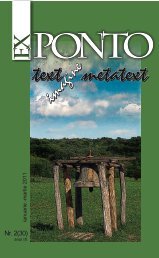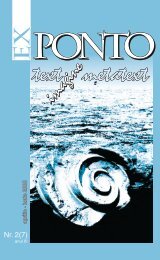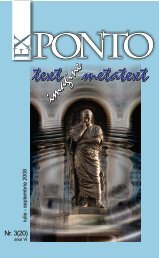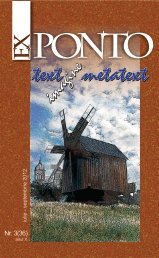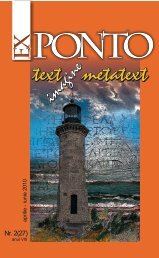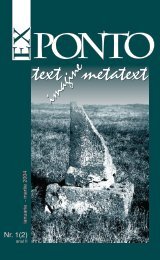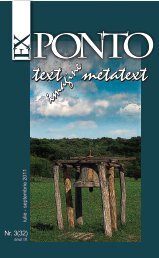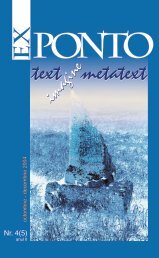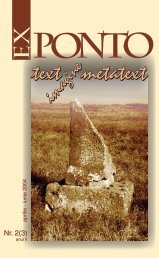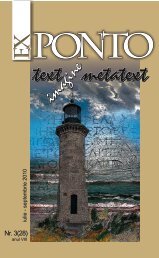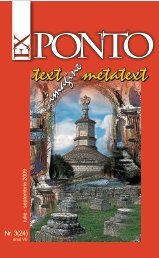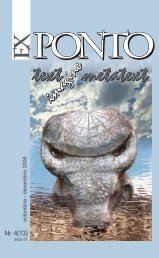Paradoxically, the myth of the unfortunate birth of writing has been referredto in writing both by Plato, one of Socrates’ direct listeners, and by Derrida,one of Plato’s readers and interpreters, not to mention the entire series ofphilosophers who followed them and their commentators. In spite of thecriticism of writing which begins with Plato himself quoting Socrates’ pointof view, that same writing has become the most validating and appreciativehuman activity. Its original disparagement became a continuous challengefor scholars who have tried to contribute to the refinement of writing throughtheir personal stylistic innovations. The long tradition of writing is an attemptto make writing overcome its ontological status of immutability (as long as itis safely preserved from intentional or accidental destruction). Actually, thephysical aspect of writing was Socrates’ target when he compared writing withpainting. For him words were as silent as images which one may interrogate asif they were the author’s representatives. Socrates anticipated the misfortunesof editors and textual scholars alike:‘The painter’s products stand before us as though they were alive, but ifyou question them, they maintain a most majestic silence. It is the same withwritten words; they seem to talk to you as though they were intelligent, but ifyou ask them anything about what they say, from a desire to be instructed, theygo on telling you just the same thing forever. And once a thing is put in writing,the composition, whatever it may be, drifts all over the place, getting into thehands not only of those who understand it, but equally of those who have nobusiness with it; … And when it is ill-treated and unfairly abused it always needsits parents to come to its help, being unable to defend or help itself’ (275 e).Considered a fixed image, the written text is an instance of physicality,which obviously is not a satisfactory support for its meaningful content.According to Plato, the potentially mistreated written text is trapped in itsconcreteness. While he himself wrote down Socrates’ utterance, exposing itto misunderstanding, he seems to completely ignore the positive aspect ofthe text’s physicality, the text as document. He is silent about his own writing,his thoughts about writing while writing about hazardous writing. However,the effort of mastering the art of writing is implicitly praised, just because hisanti-writing polemic is writing itself. Erasure makes writing more valuablesince it puts into evidence the striving for the right expression, which is sodifficult to achieve.‘…one who has nothing to show of more value than the literary workson whose phrases he spends hours, twisting them this way and that, pastingthem together and pulling them apart, will rightly. I suggest, be called a poet orspeech writer or law writer’ (278 e).Somehow, human writing is originally susceptible of imperfection anddepends on its correcting correlative, erasure. In this sense, erasure is awriting tool, part of the writing, which improves it by clearing the surface ofwriting. Writing itself is a dialectical activity: it inscribes itself producing anew wonderful object, but, at the same time, it makes dirt whenever it failsto produce a valuable and desired object. Then, only erasure can partiallyrestore its purity, offering again the support for writing anew.Ex Ponto nr.3, <strong>2006</strong>79
The Embedded Meanings of ErasureThe etymological meaning of “erasure” (Latin past participle of eradere)attaches a more active role to erasure than it is usually thought: erasure is notonly connected with writing as a dependent operation on writing, which cannottake place without the previous act of writing, but also it can be an activityin itself. The process of erasure can produce its own signs, not necessarilyaltering the written signs. The modern definition, though, makes erasureinseparable from writing. At the same time, erasure puts into evidence thespace covered by writing and uncovered by erasing, the space that hostswriting and which is often ignored because of its peripheral role of supportingthe concreteness of writing.Derrida’s point of view in Dissemination adds another theoreticalconnotation to the meaning of erasing which is no longer the act that comesafter writing, destroying the signs of writing, but the writing itself. According toDerrida, writing erases the pure meaning, which cannot be attained by writing.Writing as “trace” which “erases itself in presenting itself, muffles itself inresonating, like the A writing itself, inscribing its pyramid in difference.” 1 Thus,two conclusions can be reached: first, writing cannot support the pure meaning;second, writing cannot achieve full completeness and clearness. In Writingand Difference, he goes further and states that writing indicates the physicalabsence of what it refers to and effaces writing subjects who identify withtheir writing itself. Writing is nothing more than a trace, but a trace, which canbe erased. Otherwise, it would have been “a full presence, an immobile anduncorruptible substance, a son of God, a sign of parousia and not a seed,that is, a mortal germ.” 2Reversing the Platonic perspective on writing, Derrida tries to minimizethe importance of the written text and to increase both the contribution of theauthor’s creative act, and the relevance of its shape and material support. Atleast some of his volumes prove his interest in the way his texts are placed onthe page and how this arrangement may lead to or away from the reading.When Erasure Becomes RelevantEditing ErasureEx Ponto nr.3, <strong>2006</strong>From the perspective of the editor of a genetic edition, erasures are partof the work in progress as much as the text itself is. They put into evidencethe dynamics of authorial intentions since they indicate the places where theauthor shifts from one version to another, from one intention to another. Thus,genetic editions reveal more than the body of the text: they make visible themultiple layers of the process of textual creation and the fragility of the textunder the dis/constructive action of the writer.Hans Gabler’s genetic edition of Ulysses (1984) marks with a geometricalsymbol the spots from which the text was erased. The square with one diagonaldrawn from the right to the left is the symbol of a previous textual inscribingand then of a latter “rejection”. According to his theory, erasures are eventsthat occur in the writing process. They seem to be the counterpoint to thewriting, but still not necessarily marked if their only significance is that of makingroom for another text. Gabler seems unable to distinguish what is relevantfrom what is irrelevant; consequently he edits everything. In his attempt toget a “stable critical text”, Gabler preserves “variant records” because they80
- Page 2 and 3:
Ex PontoText/imAgine/metatextNr. 3
- Page 4 and 5:
SUMAR♦EditorialOVIDIU DUNĂREANU
- Page 6 and 7:
editorialOVIDIU DUNĂREANUScriitoru
- Page 8 and 9:
poezieIULIA PANĂ* * *Cum ar trebui
- Page 10 and 11:
* * *m-am trezit în astă diminea
- Page 12 and 13:
IOAN ŢEPELEAPoemele mirării care
- Page 14 and 15:
Mona Lisa pare a acoperi chiar şoc
- Page 16 and 17:
în schimb, asfaltul te dinamizeaz
- Page 18 and 19:
în care ai putea să îţi întinz
- Page 20 and 21:
Un ins orbecăia ca în visOchii -
- Page 22 and 23:
Şi în secunda următoareSă apar
- Page 24 and 25:
CLAUDIA VOICULESCURondeluriDoar ste
- Page 26 and 27:
OLIMPIU VLADIMIROVMulţumireTrec nu
- Page 28 and 29:
prozăFLORIN ŞLAPACO teribilă set
- Page 30 and 31:
Ah, a zis Aloisius, ia uite-l şi p
- Page 32 and 33:
viaţa multor fiinţe zaharisite, a
- Page 34 and 35:
crede în ce facem noi. Apoi, câte
- Page 36 and 37: - Dar sensibiloasă mai eşti, se s
- Page 38 and 39: publicul avizat (şi nu numai) al u
- Page 40 and 41: Din somn mă scoală-n miez denoapt
- Page 42 and 43: Lumina cunoştinţii să-i facă ar
- Page 44 and 45: memorialisticăPERICLE MARTINESCUPa
- Page 46 and 47: asta este şi drama ţării mele, a
- Page 48 and 49: provocând pagube importante, deşi
- Page 50 and 51: formidabil, într-adevăr: nouă bo
- Page 52 and 53: 11 iulie Mâine dimineaţă plec la
- Page 54 and 55: locul lor, tejgheaua şi rafturile
- Page 56 and 57: cărui frunze fâşâiau în vânt
- Page 58 and 59: originalul de lângă mine - la sca
- Page 60 and 61: traduceri din literatura românăIL
- Page 62 and 63: Rituella fête met cet être en tra
- Page 64 and 65: elogios, recunoaşterea unanimă. P
- Page 66 and 67: Furtuni înnebunind azurul, scutur
- Page 68 and 69: Mă voi înzdrăveni cu mei proasp
- Page 70 and 71: Cu suflu-i arzător crăpând buzel
- Page 72 and 73: Marin Gherasim - Diptic, 1994, ulei
- Page 74 and 75: IIIMarin Gherasim - Kairos, 2001, t
- Page 76 and 77: Marin Gherasim - Aripă, 2000,ulei
- Page 78 and 79: imagineMarin GherasimUn spirit inte
- Page 80 and 81: Retrospectivă la Muzeul Naţional
- Page 82 and 83: invitat „ex ponto”CARMEN CHIHAI
- Page 84 and 85: vine din povestea lor. Or, noi avem
- Page 88 and 89: validate or invalidate the choices,
- Page 90 and 91: versions, even those which contain
- Page 92 and 93: tries to separate the editor’s do
- Page 94 and 95: ConclusionFrom the Platonic myth of
- Page 96 and 97: Fractalul este foarte aproape de pe
- Page 98 and 99: Conceptul de text matricial (aplica
- Page 100 and 101: Proximităţi şi diferenţe, unele
- Page 102 and 103: Citit retrospectiv, Ionescu nimere
- Page 104 and 105: avangardaPAUL CERNATÎntre extremel
- Page 106 and 107: Cu relativă simpatie „revoluţio
- Page 108 and 109: cu un cuprinzător eseu al d-lui Ni
- Page 110 and 111: *În paginile revistei Integral nu
- Page 112 and 113: la „stânga plasticei şi a liris
- Page 114 and 115: geri a separării dintre artistic
- Page 116 and 117: dar cu apucături de satir. Lukrezz
- Page 118 and 119: participa direct la strălucirea su
- Page 120 and 121: situaţii politice, a bravat fără
- Page 122 and 123: Portretul de anarhist, pe care şi-
- Page 125 and 126: Poate nu întâmplător, cel care-i
- Page 127 and 128: mari scriitori români contemporani
- Page 129 and 130: se uite la foaia de/ Hârtie, care-
- Page 131 and 132: la recensământ.)/ -Pe-astea să l
- Page 133 and 134: (…)// Peste câţiva ani/ A înce
- Page 135 and 136: Ex Ponto nr.3, 2006baston, indifere
- Page 137 and 138:
cronica literarăNICOLAE ROTUNDCons
- Page 139 and 140:
Ex Ponto nr.3, 2006comentează în
- Page 141 and 142:
priveam pe furiş maxilarele descă
- Page 143 and 144:
Ex Ponto nr.3, 2006Nicolae Motoc pr
- Page 145 and 146:
VALERIA MANTA TĂICUŢURăpit pe ve
- Page 147 and 148:
Apelul la miturile precreştine est
- Page 149 and 150:
Ex Ponto nr.3, 2006şi scadenţa M(
- Page 151 and 152:
Ex Ponto nr.3, 2006cel al gepidei A
- Page 153 and 154:
Ex Ponto nr.3, 2006lizare discursiv
- Page 155 and 156:
Ex Ponto nr.3, 2006decât necesară
- Page 157 and 158:
Ex Ponto nr.3, 2006‹‹cochilie
- Page 159 and 160:
cronica literaturii străineADINA V
- Page 161 and 162:
Ex Ponto nr.3, 2006Titlul romanul a
- Page 163 and 164:
de a-l găsi pe cel care a salvat-o
- Page 165 and 166:
Ex Ponto nr.3, 2006158aservirii rus
- Page 167 and 168:
În mitul grec, odată cu suveranit
- Page 169 and 170:
Ex Ponto nr.3, 2006162nu e conţinu
- Page 171 and 172:
Un fenomen care pare pur occidental
- Page 173 and 174:
studii culturaleMARCOS FARIAS-FERRE
- Page 175 and 176:
Ex Ponto nr.3, 2006assume meaning i
- Page 177 and 178:
Ex Ponto nr.3, 2006in rapid transit
- Page 179 and 180:
Ex Ponto nr.3, 2006contingency of t
- Page 181 and 182:
production about the ‘internation
- Page 183 and 184:
Ex Ponto nr.3, 2006Dar peripeţiile
- Page 185 and 186:
Ex Ponto nr.3, 2006(24 dec. 1672 -
- Page 187 and 188:
Ex Ponto nr.3, 20061705, ambii ai P
- Page 189 and 190:
Ex Ponto nr.3, 2006Constantin Brân
- Page 191 and 192:
Ex Ponto nr.3, 2006‘separatist’
- Page 193 and 194:
Ex Ponto nr.3, 2006succedea pe tron
- Page 195 and 196:
al XVII-lea - pentru a ne limita do
- Page 197 and 198:
41Arhimandritul Neofit a ocupat fun
- Page 199 and 200:
o imagine cuprinzătoare a contribu
- Page 201 and 202:
Ex Ponto nr.3, 2006Din subcapitolul
- Page 203 and 204:
Ex Ponto nr.3, 2006Din primul studi
- Page 205 and 206:
să devină fiinţe sociale, căci
- Page 207 and 208:
sociologia cărţiiCONSTANTIN CIORO
- Page 209 and 210:
în biblioteci. Cronicarii literari
- Page 211 and 212:
Ex Ponto nr.3, 2006Lui Debussy îi
- Page 213 and 214:
Ex Ponto nr.3, 2006cumente preţioa
- Page 215 and 216:
Salonul Internaţional de carte „
- Page 217 and 218:
Ex Ponto nr.3, 2006scriitorii înş




